The lungs are resilient organs that play a vital role in respiratory function and overall well-being. However, certain habits and lifestyle choices can unknowingly damage your lungs, compromising respiratory health and increasing the risk of respiratory diseases. With over 25 years of specialized practice in respiratory medicine, infectious diseases, and tuberculosis, Dr. Kumar Doshi provides invaluable insights into common practices and behaviors that can harm your lungs. In this enlightening article, we explore ways you might be unintentionally damaging your lungs and expert recommendations for preserving lung health.
Common Habits and Behaviors Damaging Your Lungs
- Smoking and Secondhand Smoke: Smoking remains the leading cause of lung damage and respiratory diseases, including lung cancer, COPD, and emphysema. Dr. Doshi emphasizes that both active smoking and exposure to secondhand smoke can significantly impair lung function, reduce respiratory efficiency, and increase the risk of developing smoking-related illnesses.
- Poor Indoor Air Quality: Exposure to indoor air pollutants, such as mold, dust mites, pet dander, and volatile organic compounds (VOCs), can compromise lung health and exacerbate respiratory conditions. Dr. Doshi underscores the importance of proper ventilation, air filtration, and regular cleaning to minimize indoor air pollution and protect respiratory health.
- Occupational Hazards: Exposure to occupational hazards, such as asbestos, silica dust, coal dust, and chemical fumes, can cause occupational lung diseases, including asbestosis, silicosis, and occupational asthma. Dr. Doshi recommends using personal protective equipment, implementing workplace safety measures, and adhering to occupational health guidelines to minimize exposure and protect lung health.
- Lack of Physical Activity: Sedentary lifestyle habits and lack of regular exercise can lead to reduced lung capacity, diminished respiratory muscle strength, and impaired oxygen exchange. Dr. Doshi emphasizes the importance of regular physical activity, aerobic exercises, and respiratory muscle training to support lung function, enhance respiratory efficiency, and improve overall cardiovascular health.
- Unhealthy Diet and Nutrition: Poor nutrition, high intake of processed foods, and inadequate consumption of fruits, vegetables, and antioxidants can contribute to inflammation, oxidative stress, and impaired immune function, compromising lung health and increasing susceptibility to respiratory infections and diseases. Dr. Doshi recommends adopting a balanced diet, rich in nutrients, antioxidants, and anti-inflammatory foods, to support lung health, reduce inflammation, and enhance immune function.
Expert Recommendations for Protecting Lung Health
- Quit Smoking: Dr. Doshi emphasizes the importance of quitting smoking to halt further lung damage, reduce inflammation, and lower the risk of developing smoking-related diseases. Seeking support, counseling, and smoking cessation programs can significantly increase the chances of successful smoking cessation and long-term abstinence.
- Improve Indoor Air Quality: Implementing measures to improve indoor air quality, such as using air purifiers, maintaining proper ventilation, reducing moisture and humidity levels, and minimizing exposure to indoor pollutants, can help protect lung health, reduce respiratory symptoms, and enhance overall indoor environment.
- Wear Protective Equipment: Dr. Doshi recommends wearing appropriate personal protective equipment, such as masks, respirators, and gloves, when working in environments with potential respiratory hazards, chemicals, or airborne contaminants to minimize exposure, protect lung health, and prevent occupational lung diseases.
- Adopt Healthy Lifestyle Habits: Incorporating healthy lifestyle habits, such as regular exercise, balanced diet, adequate hydration, sufficient sleep, and stress management, supports lung health, enhances respiratory function, reduces inflammation, and strengthens immune defenses, reducing the risk of respiratory diseases and promoting overall well-being.
Conclusion
Understanding the common habits and behaviors that can unknowingly damage your lungs is essential for recognizing potential risks, implementing preventive measures, and adopting healthy lifestyle choices to protect and preserve lung health. Dr. Kumar Doshi’s extensive experience as an interventional chest physician underscores the significance of prioritizing lung health, understanding respiratory risks, and embracing proactive strategies to support lung function, reduce the risk of respiratory diseases, and ensure long-term respiratory health and vitality.
By recognizing and avoiding common lung-damaging habits, implementing expert recommendations, and embracing a holistic approach to lung health, you can take proactive steps to protect, support, and optimize lung function, ensuring optimal respiratory health, vitality, and quality of life.

